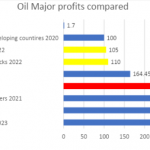6 Billion Ways and our global struggle
The struggle against neo-liberalism is global or it is nothing. It is easy to imagine that the current cocktail of poisons forced on the people of Britain is something new. But it is nothing of the sort. All around the world, people have faced the same mixture of cuts, privatisation and de-regulation. And all around the world, people have fought back.
 Our fight is global because our attackers are global. These cuts are not motivated by the economic illiteracy of George Osborne. Sure, he is illiterate. But those pushing him know precisely what they are doing. The corporations who run the more privatised countries of the world have persuaded British politicians that they must turn our public services onto their back so that they can feed from the soft underbelly of our welfare state. They have convinced our leaders that the only way for corporate capitalism to grow its way from the crater left by the collapse of the banks is through the privatisation of the welfare state – a privatisation that they know will be politically much easier if services are first so run down that few will fight for them. These corporate megaliths are not, primarily, domestic. United Health UK – one of the companies grabbing our NHS with its grubby hands – is part of the United Health Group – an American company who led the assault on Obamacare, a company whose president personally pocketted 1 in every 700 dollars Americans spent on healthcare, in one recent year. As long as so much political power is concentrated in the hands of any corporation, anywhere, our public services will be under threat from that power. And so the struggle of the people of Wisconsin is our struggle. The struggle of any people against the power of plunderers is a struggle to defend us all from their piracy.
Our fight is global because our attackers are global. These cuts are not motivated by the economic illiteracy of George Osborne. Sure, he is illiterate. But those pushing him know precisely what they are doing. The corporations who run the more privatised countries of the world have persuaded British politicians that they must turn our public services onto their back so that they can feed from the soft underbelly of our welfare state. They have convinced our leaders that the only way for corporate capitalism to grow its way from the crater left by the collapse of the banks is through the privatisation of the welfare state – a privatisation that they know will be politically much easier if services are first so run down that few will fight for them. These corporate megaliths are not, primarily, domestic. United Health UK – one of the companies grabbing our NHS with its grubby hands – is part of the United Health Group – an American company who led the assault on Obamacare, a company whose president personally pocketted 1 in every 700 dollars Americans spent on healthcare, in one recent year. As long as so much political power is concentrated in the hands of any corporation, anywhere, our public services will be under threat from that power. And so the struggle of the people of Wisconsin is our struggle. The struggle of any people against the power of plunderers is a struggle to defend us all from their piracy.
Our fight is global because those who have already wrecked our economy have globalised. The idea that we must race to the bottom in order to build a prosperous nation is bollocks. Try telling that to the people of of Iceland or the people of Ireland – or to the people of Sweden, or the people or the people of Costa Rica. But we can’t dismiss it that easily. As long as multinational corporations continue to exist and can find cheaper and more easily abused labour abroad, they will always threaten those who they have made dependent on them. And so the struggle of Bangladeshis for fair wages is inextricably linked to our struggle to fair wages.
The idea that individual governments are powerless against footloose finance is bollocks. Building a post-neoliberal economy will be much harder if we must bear the weight alone, but the more people work together, the lighter this weight will become.
Our struggle is global because we all face the same crises – the crash of capitalism, the crunch of the climate, and, one day, the end of oil.
Our struggle is global because we can learn from each other. It was not without a fight that the people of Bolivia chased the darkness of neo-liberalism from their country. The Shock Doctrine the people of Britain face today is the same one that the peoples of Africa, Latin America and Asia faced in the 1970s. They too resisted, and many of them won. We must learn how they did so.
And our struggle is global because our power comes from numbers. While they have money and they have guns, we have each other. As we’ve seen in Egypt, and Tunisia, and Libya, concentrations of power can only be challenged by mass movements. For too long progressives in Britain have believed that our power comes from the strength of our argument – that we will win win by speaking truth to power – as though we can convince the billionaires with the glossiness of our reports. The truth is that speaking truth to power isn’t enough. We must see where our power lies, and we must play to our strengths. And if it is numbers we need, then surely our movement is best when it is international?
And finally, our struggle is global because we can’t pretend we don’t care about each other. When an earthquake tipped plundered Haiti into carnage, I curled up and wept. As people across the Arab World build a movement for democracy, my heart quickens its pace. As students in the UK fought for education and their futures, we received messages of solidarity from Greece, and from America and from across the planet. Because people everywhere are the same, and people everywhere care.
And if our struggle is global, if there are lessons to be learnt and bonds to be forged, then the Six Billion Ways conference is the place to begin. This Saturday, in Rich Mix, at Hackney, activists will come together from across the UK and across the world to share tactics, share stories, and share beer. With discussions on everything from cuts to the Arab uprisings, and activists from as far away as Egypt and Bolivia, 6 Billion Ways will be the place to be. Because while all politics is local, our struggle is global.



See you there. Have profiled the programme here – http://politicaldynamite.com/2011/03/6-billion-ways-5-6-march-a-preview/
I stopped using Tesco, now use the Cooperative membership and Coop Bank, and I am joining SSP Just another six billion ways.
To stop Coporations bleeding the poor to death, via greed. A more equal and ethical society, within Socialism, not just reforms. Will end slavery, suffering and poverty.
Would really love to be there, Adam; but busy on Sheffield’s response to LibDem conference. Another of the six billion ways.
In solidarity
Peter
Hey Adam, on Sat I Will be thinking about you in Hackney& thinking about my daughter Helen in Bolivia & and thinking about how sooooo bloody right you are. All the while I am thinking I will be planting ‘corporate proof’ fruit trees with my neighbours in our new community orchard in Comrie – just one of 6 billion ways. Best of luck with firing up the others.